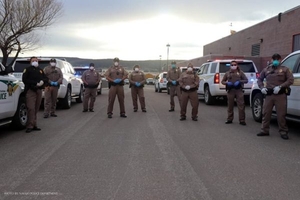
- Details
- By Native News Online Staff
WINDOW ROCK, Ariz. — The Navajo Nation has surpassed 600 deaths from Covid-19. On Sunday, the Navajo Nation reported four Covid-related deaths which brings the death toll to 602.
When compared to states, the Navajo Nation has more Covid-related deaths than the following states: Alaska (98 deaths); Hawaii (222 deaths); Maine (165 deaths); Montana (520 deaths); New Hampshire (499 deaths); Vermont (59 deaths); West Virginia (582 deaths); and Wyoming (144 deaths).
On Sunday, the Navajo Department of Health, in coordination with the Navajo Epidemiology Center and the Navajo Area Indian Health Service, also reported 117 new COVID-19 positive cases for the Navajo Nation. Reports indicate that 7,926 individuals have recovered from COVID-19, and 138,332 COVID-19 tests have been administered. The total number of positive COVID-19 cases is now 13,373, including seven delayed unreported cases.
Navajo Nation COVID-19 positive cases by Service Unit:
- Chinle Service Unit: 2,941
- Crownpoint Service Unit: 1,463
- Ft. Defiance Service Unit: 1,348
- Gallup Service Unit: 2,054
- Kayenta Service Unit: 1,493
- Shiprock Service Unit: 2,001
- Tuba City Service Unit: 1,376
- Winslow Service Unit: 688
* Nine residences with COVID-19 positive cases are not specific enough to place them accurately in a Service Unit.
The Navajo Nation’s latest COVID-19 public health emergency orders go into effect on Monday, Nov. 16, which implement a three-week stay-at-home lockdown for the entire Navajo Nation, implement new safety provisions and requirements for businesses, and calls for schools to implement online learning only, to help reduce the uncontrollable spread of COVID-19.
On Sunday, the state of New Mexico reported 1,033 new cases of COVID-19, the state of Arizona reported 2,383 new cases, and Utah reported 2,667 cases.
“Unfortunately, it appears that this pandemic is going to get worse before it gets better. The projections from our health care experts indicate that the Navajo Nation, as well as the country, is on an upward trajectory in terms of new cases of COVID-19. The sooner we all do our part to stay home consistently, avoid gatherings, and social distance, the sooner we will reach our peak and hopefully begin to see a decline in new cases," Navajo Nation President Jonathan Nez said.
"If our Navajo citizens don’t abide by the three-week stay-at-home lockdown, then we’re going to see even more cases and our health care system is going to be overwhelmed very quickly. We have to do it ourselves. Our leaders and health experts can caution every one constantly, but each of you has to make good choices and stay home as much as possible. Please hold yourselves and your loved ones accountable and please pray for our Nation," Nez continued.
On Monday, an Executive Order will go into effect for the closure of government offices with the exception of essential employees for the next three weeks. Division directors are directed to determine which employees are essential and non-essential and to ensure their respective divisions continue essential services, including continuing with CARES Act fund projects.
To encourage residents to stay local during the three-week stay-at-home lockdown, gas stations, grocery stores, laundromats, and restaurants and food establishments will remain open between the hours of 7:00 a.m. (MST) and 3:00 p.m. (MST). These businesses are required to ensure employees and customers wear masks, practice social distancing, disinfect high-touch surfaces, access to hand wash stations, sanitizers and gloves, and limit the number of customers in any enclosed areas.
More Stories Like This
Native News Weekly (August 25, 2024): D.C. BriefsNative News Weekly (February 22, 2026): D.C. Briefs
NCAI Releases Sttatement on the Passing of Rev. Jesse Jackson
Colusa Indian Energy Participates in Port of Quincy Town Hall on Columbia Basin Power Project
Q&A: Jingle Dress Dancer Answered Call to Ceremony in Face of ICE Violence
Help us defend tribal sovereignty.
At Native News Online, our mission is rooted in telling the stories that strengthen sovereignty and uplift Indigenous voices — not just at year’s end, but every single day.
Because of your generosity last year, we were able to keep our reporters on the ground in tribal communities, at national gatherings and in the halls of Congress — covering the issues that matter most to Indian Country: sovereignty, culture, education, health and economic opportunity.
That support sustained us through a tough year in 2025. Now, as we look to the year ahead, we need your help right now to ensure warrior journalism remains strong — reporting that defends tribal sovereignty, amplifies Native truth, and holds power accountable.
 The stakes couldn't be higher. Your support keeps Native voices heard, Native stories told and Native sovereignty defended.
The stakes couldn't be higher. Your support keeps Native voices heard, Native stories told and Native sovereignty defended.
Stand with Warrior Journalism today.
Levi Rickert (Potawatomi), Editor & Publisher

